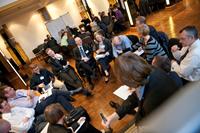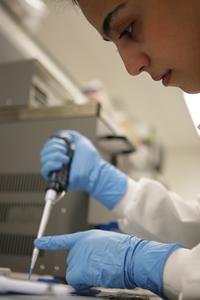|
If you are having problems viewing this email click here
|

|

|
Universities rise to efficiency challenge - news from the N8 Partnership
|
|

|
|
Welcome to the latest ebulletin from the N8 Research Partnership.
UK universities are important drivers of the economy – but we know we need to use our resources in better ways to deliver maximum efficiency. The ‘Making the Best Better’ report we published in May includes some of the ways in which universities, including the N8 partners, are delivering efficiencies and was highlighted by David Willetts in his speech to the HEPI conference last month.
Alongside new areas such as lecture podcasts and sharing energy costs with the NHS, one key innovation detailed in the report is the new arrangements for sharing research equipment. We recently launched n8.equipment.org.uk – a publicly available online database of research equipment across the N8 universities. When complete, it will hold more than 4,000 items. At the click of a mouse, researchers can see what equipment is available, and it's helping us open our doors to industry too.
The N8 has received funding from the Arts and Humanities Research Council to explore the role for academic-practitioner collaborations in the arts and humanities to generate economic growth. This is an exciting new project for us and I am looking forward to seeing the outcomes from workshops covering four themes: digital, heritage, sustainability and the imagination.
Finally, it is always good to see creative sparks between N8 academics and industry partners leading to new research projects. Smith & Nephew are now working with partners in York following an idea developed at the first N8 Industry Innovation Forum. Meanwhile, Regener8 are supporting researchers at Sheffield to work with a Nottingham-based firm to develop new bone cements which have potential uses in the orthopaedics market.
I hope you enjoy reading this bulletin and please do get in touch with your comments and ideas.
Best regards,
Sarah Jackson
Director, N8
|
|
|
|

|

|
Universities rise to the efficiency challenge
Universities are saving billions by sharing high-value resources and using innovative technologies, Minister for Universities and Science David Willetts revealed in his speech to the HEPI conference in May.
Our report, 'Making the Best Better', commissioned by the Department of Business, Innovation and Skills (BIS) highlights the efficiency programmes being implemented by institutions including the University of Leeds, The University of Manchester, Newcastle University and the University of Oxford.
David Willetts said: "This interesting report shows the UK's universities at their best; innovating and pushing boundaries.
By working together with other institutions and businesses, universities not only benefit from cost efficiencies, but greatly improve student experiences, from offering lectures as podcasts, to giving them the chance to work with high-performance equipment."
Following publication of the report, The Guardian featured an article by Chris Brink, Chair of the N8 Board, and Sarah Jackson, N8 Director, on its Higher Education network website. Additionally, Sarah also wrote on the UUK Efficiency Exchange blog about her experience of working in BIS, which is nothing like The Thick of It!
The 'Making the Best Better' report will help inform the next Spending Review in 2013 and help share best practice across the sector.
Read the full press release here.
Read the full report here.
|
|
|

|

|
N8 Asset Database launches
In May, the N8 Shared Equipment Inventory System launched. This is a fully searchable online database which can be used to locate and request access to research equipment and facilities across the N8 partnership.
The database has been developed as a result of the work taken forward following the publication of the Wakeham Review of efficiencies in research funding. Following the Review, we established a project, funded by the Engineering and Physical Sciences Research Council, to examine the opportunities, barriers and current best practice in sharing research equipment.
This identified the need for a web-based asset register to enable researchers across the N8 and beyond to search for equipment within an institution or by a particular sector.
The database is freely open to anyone to search, including researchers, funding bodies and policy makers. In this way, it will enable greater clustering of equipment across institutions and create opportunities for more effective usage of research capability and resources across the N8 universities and the private sector. Once fully completed there will be around 4,000 items in the database.
To view the database, click here.
|
|
|

|

|
N8 Partners get funding for ‘New thinking from the North’
The N8 Partnership has been awarded funding from the Arts and Humanities Research Council (AHRC) to explore how universities can work closer with the arts and humanities sector across the north of England to stimulate reinvention and influence economic growth.
This is the first time that the N8 Partnership has engaged with the arts and humanities research community. As part of the project, a series of workshops will take place, addressing four key themes:
• Digital North – looking at how digital is being used to create and sustain culture, identity and community in the North.
• Heritage North – looking at the heritage economy in the North and how heritage-based regeneration affects communities.
• Sustainable North – looking at how the economic, social and environmental development of the North are connected and how they can be made sustainable and resilient
• Imaginative North – looking at how the imagination is being used to influence social and cultural development in the North.
The project is being co-ordinated by the University of Liverpool. Professor Dinah Birch, Pro-Vice-Chancellor for Research & Knowledge Exchange at the University of Liverpool, said
“The cities represented by the N8 university partners have a history of self-reinvention and have dynamic economies and vibrant arts scenes. Culture can fuel reinvention, helping people to adapt to change and generate ideas for sustainable and fair models of development – and these workshops will explore how this can be achieved."
The outcomes from the research will be presented as a policy report for local authorities and is expected to be completed in 2014. Information about the workshops will appear on the N8 website and in future ebulletins.
Read more here.
|
|
|

|

|
N8 Industry Innovation Forum generates new research partnerships
The N8 Industry Innovation Forum (N8IIF) is playing a vital role in bringing together new partners to generate innovative ideas for research.
Discussions at the first meeting of the N8IIF, focussed on Advanced Materials, generated 25 new industry-led ideas for research, of which a number have now progressed to Stage 2 funding.
One of these is a project to investigate how plasma can influence colonies of microbes, otherwise known as biofilms, found to be involved in a variety of microbial infections of chronic wounds, making them difficult to treat with conventional therapies.
The project is led by Dr Deborah O'Connell and project-managed by Dr Kate Lancaster for the University of York.
Dr Lancaster explains: "In the past, my colleagues and I have found it difficult to identify the right people in industry to talk to, but the N8IIF brought us all together in the same room.
"Because of the 'arena of trust' the forum provides, we were all able to have open conversations about our work. As a result, we've developed fruitful relationships with partners we would have found difficult to engage with otherwise.”
Dorothy McCulloch, Technology Analyst at Smith & Nephew's Advanced Wound Management Division in Hull is also a partner in the plasma project. She said: “Forums such as the N8IIF are a good way for us to meet the academics working in some exciting areas, such as plasma."
A further N8 Industry Innovation Forum will take place later this year. More information about this, including the theme, will appear on the N8 website in the coming months.
|
|
|

|

|
Proof of Concept funding cements future for regenerative medicine project
Regener8 and the Medical Technologies Innovation and Knowledge Centre (IKC) have awarded N8 Proof of Concept funding to Professor Paul Hatton from the School of Clinical Dentistry, Bioengineering and Health Technologies at the University of Sheffield.
The project will aim to prepare an innovative bone cement which can be used in situ with a pre-set porous scaffold to promote bone tissue regeneration, and will be carried out in partnership with Corinthian Surgical Ltd, a Nottingham-based company specialising in developing innovative biomaterials.
The new technology could have applications in the treatment of conditions relating to the ear, as well as potential wider uses in the orthopaedics market as a bone graft substitute.
The awards provide exclusive funding for regenerative medicine projects to accelerate and enhance innovation between an N8 academic lead and industry collaborators in projects that demonstrate significant commercial potential.
The funding is provided by the Medical Technologies IKC (funded by the UK Research Councils, the Engineering and Physical Sciences Research Council (EPSRC) the Biotechnology and Biological Sciences Research Council (BBSRC), and the Technology Strategy Board).
One further project, from the University of Manchester, has been approved subject to contract and further details will be announced soon.
|
|
|
|
|





